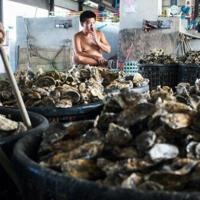Growing up on Taiwan’s west coast where mollusc farming is popular, Eddie Wang was inspired to create “Seawool”, an environmentally friendly fabric, by seeing discarded oyster shells being used as insulation in his hometown of Yunlin. Residents would burn the shells and use the residue to keep their homes warm in the winter and cool in the summer.
Wang, the founder of Creative Tech Textile company, experimented with oyster shell residue to create a fabric similar to wool, resulting in Seawool. His factory in Taiwan uses around 100 tonnes of oyster shells annually to produce 900 tonnes of Seawool, generating significant revenue mainly from European and American outdoor and sustainability clothing brands.
The unique oyster farming culture of Taiwan plays a crucial role in Seawool’s production chain, with the island harvesting about 200,000 tonnes of oysters annually, resulting in 160,000 tonnes of discarded shells. These shells are repurposed by Wang’s factory, ground into beads, and combined with recycled plastic bottle yarn to create Seawool.
Seawool is a low-carbon product that captures and stores carbon dioxide from the atmosphere and does not require water in its production. Taiwan Sugar Corporation also utilizes discarded oyster shells for manufacturing household items, contributing to environmental sustainability.
The transformation of oyster shells from waste to valuable raw material symbolizes Taiwan’s commitment to sustainability and innovation, turning what was once considered trash into a valuable resource.





